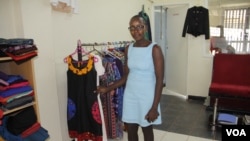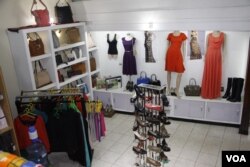For 35-year-old Mercy Makena, fashion is part of her soul. Culturally, she’s African. But like other business people on the continent, she purchases fabrics for her own clothing designs from China.
The Nairobi-based fashion designer, who has successfully carved herself a niche in Kenya’s fashion industry said China many small business owners are happy to gain access to “high quality products at affordable prices.”
“I’m quite excited," she exclaimed, "about the great openings created by China. It has been a good journey because every time I travel there I bring back goods that are not only unique but that clients really appreciate.
“For China to open doors for us – small company owners – to be able to go and purchase in small quantities, it has enabled us to bring back home quality that is actually needed as opposed to waiting for other wholesalers who bring in fabrics from our downtown market and they use cheap quality.”
Makena, who has been traveling to China since 2012, says she uses the imported fabrics to mend high-quality outfits for a growing number of middle-class and high-end clients. They include men, who are interested in some of the pants and shirts she designs.
She says fellow businesspeople with connections to the huge Asian market convinced her to give it a try.
““I realized once you are able to identify your niche in the local market then you can go there and source your products at a fair price and which are of very high quality and give a competitive edge back home,” said Makena.
The Kenyan entrepreneur says that gaining entry into the diverse Chinese marketplace has paid off handsomely.
As a young girl growing up in a rural village in Meru on the slopes of Mount Kenya, she knew little about fashion but she saw and admired what her mom was doing – running a tailoring shop.
“At the time," she said, "I discovered that I loved stitching clothes. It’s a passion since I was young. My mom had a tailoring shop – she didn’t put it up to inspire me or anyone else in the family; she just set up a shop for herself amongst other business ventures, such as a butchery.”
Following in her mother’s footsteps, Makena set up a fashion business in Nairobi, in January 2000, just after completing her high school education.
“At first,," she said, "my parents were worried, but I was determined. I wanted to go into clothing; the line wasn’t clear then but I was very sure that I wanted to go into clothing.
“What inspired me was the need for quality clothing in the market. It was quite challenging when it came to space but I was able to secure a space where I would share with someone else.
“We would rent everything from the machine to the shop itself which was payable at the end of the month. You just needed to work hard to have money to pay the owners.”
Within a few years into her business, Makena nurtured a growing clientele, which provided her with savings for future expansion.She later moved her operations to the city center where she opened a fashion house.
She says celebrities are always looking for the best -- they want to set themselves apart and stay ahead of other well-dressed celebrities. Her fashion business, known as Nakyma Fashion House mostly deals with orders from the corporate world, focusing on official women’s wear.
“That’s our main line. We design from scratch and have something that works with someone’s body structure, tone and color. We are also now getting into weddings because the same clients keep asking us for more. Some want us to design their wedding wear.
“We also accessorize for them," she said. We are able to get them bags, shoes and purses to go with their clothing designs so that we help them with the mix and match of their everyday wear.”
Despite the overriding benefits, challenges also abound.
Most Chinese do not speak English or other international languages. This presents a hurdle for many entrepreneurs from Africa who know very little Chinese.
The Kenyan fashion designer laments that there have been cases of counterfeit goods finding their way to the African continent. She’s even received what she says is counterfeit – or low quality – fabrics.
“If you choose not to buy counterfeit," she saids, "then they shouldn’t choose to send it to you,” she said referring to two incidents where she became a victim of fake goods. Going to China in person has settled the problem.
Born in family of six sisters, Makena believes that Africa is the place to be due to the economic growth and development activities taking place.
“There are a lot of opportunities in Africa," she said, "one only needs to get into it with full confidence.” The could mean – as a next step – expanding her business, and providing high-quality clothing across East Africa.
So far, her fashions are also selling well in Uganda and Kenya. With luck, she hopes to expand her clientele outside to the rest of Africa and beyond,even back to China.It’s what economists call adding value – and a better price -- to African-made goods for export to foreign markets.
That good news for her, and for Kenyan employees who’d gain skills and a good job from her success.






